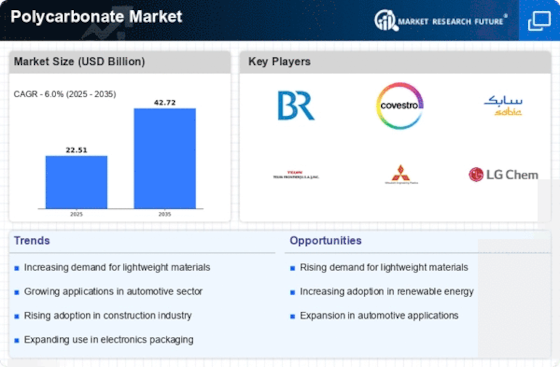Top Industry Leaders in the Polycarbonate Market

Polycarbonate Market
Polycarbonate, the plastic superhero with exceptional clarity and resilience, However, behind this glittering facade lies a dynamic landscape of fierce competition, evolving demands, and environmental whispers. Let's delve into the strategies, factors, and trends shaping the future of this transparent titan.
Market Share Strategies:
-
Product Diversification: Leading players like Covestro and Mitsubishi Chemical Holdings are expanding beyond traditional sheet and film applications, offering specialty grades for automotive lenses, medical devices, and even bulletproof glass. -
Technological Advancements: Pioneering new resin formulations and production processes (think SABIC's LEXAN™ EXL resins for improved scratch resistance) is key to differentiation and performance optimization. -
Sustainability Push: Developing eco-friendly options like bio-based polycarbonate and closed-loop recycling systems, exemplified by Eastman Chemical's TRITAN Renew technology, is crucial for future success. -
Regional Expansion: Targeting high-growth regions like Asia-Pacific and Eastern Europe, driven by booming electronics and automotive industries, presents significant opportunities. LG Chem's strategic partnerships in Southeast Asia exemplify this trend.
Factors Influencing Market Share:
-
Fluctuating Raw Material Prices: The volatility of key raw materials like bisphenol A and phosgene can impact profit margins and product pricing. -
Evolving Customer Demands: Growing miniaturization and heat dissipation requirements in electronics call for advanced polycarbonate formulations with improved thermal stability and dimensional accuracy. -
Stringent Environmental Regulations: Restrictions on bisphenol A usage and waste disposal in some regions, like the EU's REACH regulations, influence material choices and production processes. -
Alternative Materials: Development of scratch-resistant glass and emerging polymers like polyetherimides can pose challenges for traditional polycarbonate applications.
Key Players
- Covestro AG (Germany)
- SABIC (Saudi Arabia)
- Teijin Limited (Japan)
- Mitsubishi Engineering Plastics Corp. (Japan)
- LG Chem (South Korea)
- Trinseo (US)
- Formosa Chemicals & Fibre Corp (Taiwan)
- LOTTE Chemical CORPORATION (South Korea)
- Chi Mei Corporation (Taiwan)
- Idemitsu Kosan Co. Ltd. (Japan)
- Bayer Material Science AG
- Centroplast Engineering Plastics GmbH
- Royal DSM
- Asahi Kasei Chemical Corporation
Recent Developments
Holland Company, which serves as a major distributor of thermoplastic resins, was also one of the largest manufacturers involved in polymers in October 2018. They have entered into a contract with Polymershapes regarding expanding their portfolio by adding Polysource under their brand name; this means that the customers will be able to purchase both products from one source.
On February 14th, Teijin Limited announced that it had received an ISCC PLUS certificate sustainable-product certification from the International Sustainability & Carbon Certification (ISCC) system on biomass-derived bisphenol A (BPA) polycarbonate resin products produced in Japan. The first Japanese company to achieve ISCC PLUS certification is Teijin PC resin products. Certified biomass PC resin products are physically indistinguishable from conventional petroleum-derived BPA-based resins, making them suitable for commercial applications such as car headlights or electronic parts.
January 2024 has seen the beginning of their manufacturer, Kazanorgsintez, part of SIBUR and Russia’s only plant for polycarbonate production. Kazanorgsintez has initiated the output of new types of polycarbonates – PC-022URC1 and PC-010URC. These materials are meant to make car headlamp covers, which can completely substitute previously used imported ones that are now unavailable in Russia. As a single producer of polycarbonate in the CIS, who was able to offer processors domestic products at a level not below foreign analogs (or even superior to them) with respect to certain physical and mechanical properties, Kazanorgsintez is geared up to supply these items to the market. Both domestic and foreign manufacturers have already shown interest in this brand-new pair of plastics that is intended for auto lighting goods producers.










